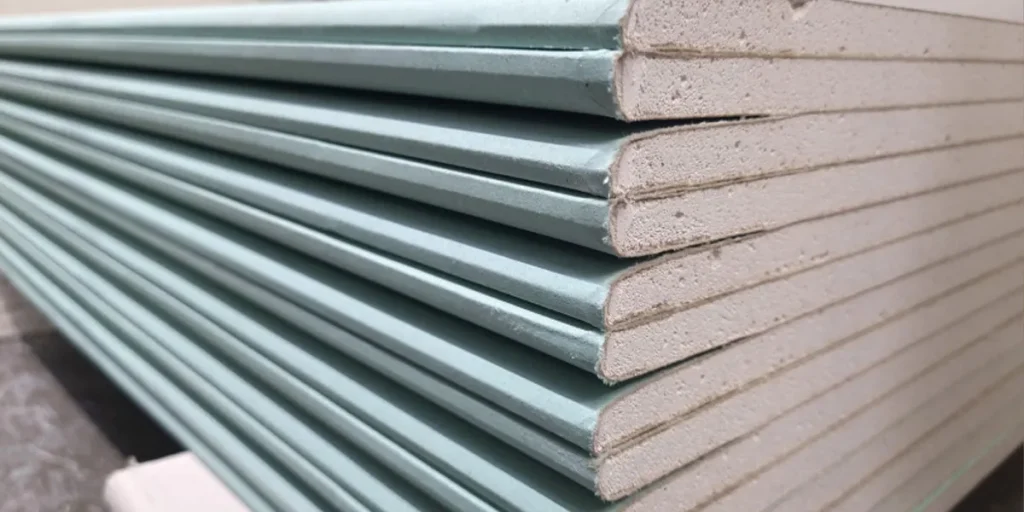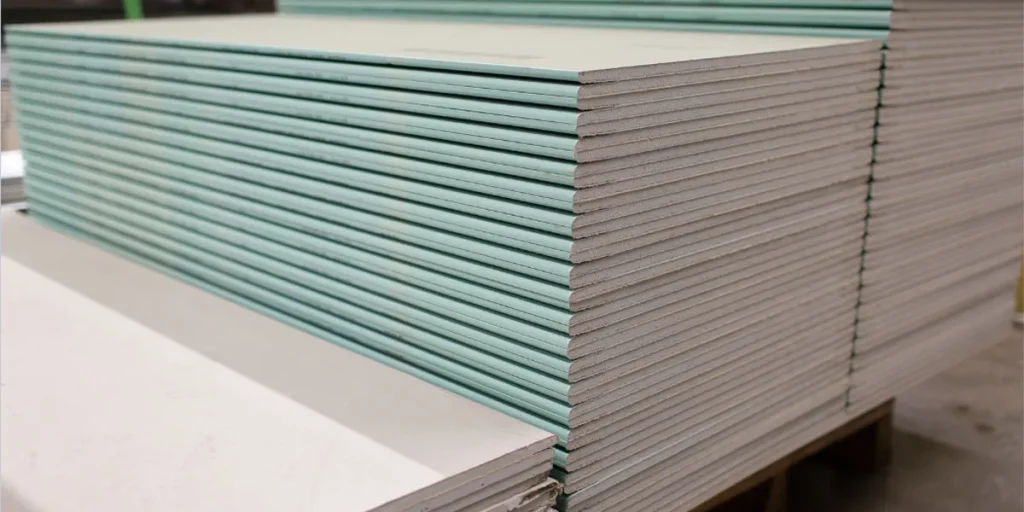A 4×12 sheet of drywall typically weighs around 90 pounds. The weight can vary slightly based on the type and brand.
Drywall, also known as gypsum board, is a staple in modern construction, providing a fire-resistant interior finish for walls and ceilings.
Professionals and DIY enthusiasts alike often handle 4×12 sheets in residential and commercial projects due to their efficient coverage of larger areas.
While navigating the complexities of a build or renovation, understanding the weight of such materials is crucial for both planning the logistics of transportation and ensuring structural integrity.
With a standard thickness of 1/2 inch, these large sheets offer a balance between durability and manageability, although their size requires careful handling to avoid breakage.
It’s essential to consider the weight for installation purposes, as it impacts the manpower and support tools necessary for a safe and proper set-up.
Basics Of Drywall Sizes And Weights
Understanding drywall sizes and weights is crucial for proper installation and safety. Different projects require varied types and sizes of drywall.
Knowing the weight of each sheet helps in planning for transportation and support structures. Below are important aspects of drywall sizes and weights you should know.
Common Drywall Dimensions
Drywall comes in several standard sizes. Here’s a quick guide:
- Length: Typically 8, 10, or 12 feet
- Width: Usually 4 feet
- Thickness: Ranges from 1/4 inch to 5/8 inch
The 4×12 foot sheet is a popular choice for large projects. It offers a broad coverage area with fewer seams.
Material Factors Affecting Weight
The weight of a drywall sheet can vary due to:
- Type of drywall: Standard, moisture-resistant, or fire-resistant
- Core material: Gypsum mixed with other materials
- Density: Higher density equals more weight
A 4×12 sheet of drywall typically weighs around 54-58 pounds, with variations based on thickness and type. Use this information to ensure your walls can support the drywall you choose.
Note: Above weights are approximate; confirm with manufacturer specifications.
Unpacking The 4×12 Drywall Sheet

Before tackling any construction project, it’s essential to understand the materials involved. A popular choice among builders is the 4×12 drywall sheet.
Its size and weight influence transport needs, labor costs, and ease of installation.
Let’s delve into what these sheets entail and why they might be the right fit for your construction needs.
Dimensions Explained
A 4×12 drywall sheet measures 4 feet wide by 12 feet long. The typical thickness is about 1/2 inch.
Based on these dimensions, the weight of a single sheet can be roughly 80 to 100 pounds. The exact weight depends on factors such as the brand and moisture content.
| Width | Length | Thickness | Approximate Weight |
|---|---|---|---|
| 4 feet | 12 feet | 1/2 inch | 80-100 pounds |
It’s important to consider this weight when planning for transport and installation. Safety during handling is paramount.
Why Choose 4×12 Sheets?
Choosing a larger sheet size offers distinct advantages. We’ll list the most compelling reasons to help inform your decision.
- Less Seams: Bigger sheets mean fewer joints to tape and finish.
- Faster Installation: Covering wall and ceiling areas with larger sheets speeds up completion time.
- Improved Aesthetics: With fewer seams, walls and ceilings appear smoother and more uniform.
Remember, working with bigger drywall sheets typically requires two people due to the size and weight. Professional installation ensures the best results and safety.
Calculating The Weight Of 4×12 Drywall

Are you planning a drywall project but puzzled by its weight? The sheet size matters. Specifically, the 4X12 drywall sheet is a common choice.
It’s time to dive into the numbers and understand exactly how much these hefty sheets might add to your load.
Standard Weight Metrics
Finding out the weight of a 4X12 drywall sheet is straightforward. It starts with knowing the standard weight per square foot.
This number varies for each type of drywall. The typical weight is between 1.6 to 2.31 pounds per square foot.
A 4X12 sheet has 48 square feet of material. Multiply the standard weight by 48, and you’ll have your answer. Here’s a quick reference:
| Drywall Type | Weight per Sq. Ft. | Total Weight |
|---|---|---|
| Regular | 1.6 lbs | 76.8 lbs |
| Type X | 2.31 lbs | 110.88 lbs |
Note that these are average values. Actual weights might vary slightly due to moisture content or manufacturer.
Impact Of Drywall Thickness
Drywall comes in different thicknesses, affecting its weight. In the US, the most common thicknesses are 1/4″, 3/8″, 1/2″, and 5/8″.
A 4X12 sheet of 1/2″ drywall generally deemed standard, weighs in on average at around 82 pounds. For the more robust 5/8″ thick sheets, you are looking at about 104 pounds.
- 1/4″ drywall is lighter, easier to maneuver.
- 3/8″ drywall offers a middle ground in weight.
- 5/8″ drywall, often used for fire resistance, is heaviest.
Always consider the thickness when planning for transportation and installation. Safety is key in handling these large sheets, to avoid injury or damage.
Handling And Installation Tips
Working with 4×12 sheets of drywall poses unique challenges due to their size and weight. Preparation and technique are key.
The right handling and installation methods ensure a safe and efficient project. Below are some vital tips and best practices for transporting and installing these large sheets.
With care and precision, your drywall project can be hassle-free.
Transporting 4×12 Sheets
Transporting large 4×12 drywall sheets requires planning. Their substantial weight and bulkiness may make transportation daunting. Understanding the right methods is crucial.
- Team Lift: Always use at least two people to move them. This reduces the risk of injury and damage to the drywall.
- Clean Path: Ensure a clear path from the transportation vehicle to the installation location. This prevents trips and falls.
- Support the Middle: While carrying, support the center of the sheet to avoid snapping. Drywall is rigid but can break under stress.
Best Practices For Installation
Installing 4×12 drywall sheets efficiently is crucial. Here are the best practices that promote a smooth installation process:
- Plan Layout: Measure walls and plan the layout before starting. This ensures minimal cutting and waste.
- Tools Ready: Have all necessary tools at hand. This includes a drywall T-square, utility knife, and screws.
- Lift Correctly: Use a panel lift or a helper when positioning drywall onto walls or ceilings. This maintains safety and precision.
Secure Panels: Start affixing drywall from the top down. Secure the panels firmly to the wall studs with appropriate screws.
Keep screws neatly aligned for a tidy finish. Strong attachments prevent future sagging or displacement.
Seamless Joints: Ensure tight seams between panels for a smooth surface. Apply joint tape and compound as per recommendations for best results.
Let drywall joints cure fully before sanding for a professional appearance.
Safety Considerations And Weight Limits
Handling a 4×12 sheet of drywall demands attention to safety. These panels are heavy and cumbersome. They can pose risks if not moved correctly.
Safeguarding against injury and structural damage is a must when dealing with such materials.
Ensuring Proper Support
Secure handling and transportation of drywall are key to prevent accidents. A 4×12 sheet of drywall typically weighs around 82 to 115 pounds.
The weight varies depending on the thickness and type of drywall. It’s important to use the right equipment and techniques to carry these sheets:
- Use drywall lifts to hoist and hold panels in place.
- Work in pairs or teams to share the load.
- Drywall carts can ease transportation over distances.
Understanding Load Bearing Capacity
Before installation, know the load bearing capacity of walls and ceilings. This is crucial to prevent structural failure. The framework should support the weight of drywall sheets:
- Check the strength of studs and joists.
- Confirm compatibility of materials.
- Inspect existing structures for wear or damage.
Consult building codes and regulations for weight limits and requirements. Stay mindful of the cumulative load on structures.
This includes the weight of multiple drywall sheets, as well as additional layers like plaster or tile.
| Drywall Thickness | Typical Weight |
|---|---|
| 1/4 inch | ~38 lbs (4×12 sheet) |
| 1/2 inch | ~54 lbs (4×12 sheet) |
| 5/8 inch | ~70 lbs (4×12 sheet) |
| 3/4 inch | ~82 lbs (4×12 sheet) |
Note the importance of even distribution of weight across supporting structures to prevent bowing or collapse. Adhering to these safety considerations ensures a successful and secure installation.
FAQ About the Weight of A 4×12 Sheet Of Drywall
What Is The Weight Of A 4×12 Drywall Sheet?
The weight of a 4×12 drywall sheet can vary depending on thickness.
Generally, a 4×12 foot sheet of 1/2-inch thick drywall weighs approximately 84 pounds.
For thicker 5/8-inch panels, the weight can be around 104 pounds.
How Does Thickness Affect 4×12 Drywall Weight?
The thickness of drywall is a major determinant of its weight. As thickness increases, so does weight.
A 4×12 sheet of 1/2-inch drywall typically weighs 84 pounds, whereas a 5/8-inch sheet weighs around 104 pounds, due to the added material.
Can I Move A 4×12 Drywall Sheet Alone?
Moving a 4×12 drywall sheet alone can be challenging due to its size and weight.
Standard 1/2-inch drywall weighs about 84 pounds and may require at least two people to maneuver safely.
Always assess your strength and safety before attempting to move it solo.
Is 4×12 Drywall Heavier Than Regular Sizes?
Yes, a 4×12 drywall sheet is larger and therefore heavier than smaller, more standard sizes.
For example, a 4×8 sheet of 1/2-inch drywall is around 54 pounds, making the 4×12’s 84-pound weight significantly heavier, due to the extra four feet of material.
Conclusion
Wrapping up our discussion, it’s clear that a 4×12 sheet of drywall has a substantial weight, typically between 52 and 80 pounds. Such knowledge is crucial for both transport and installation planning.
Keep these figures in mind to ensure a smooth and safe construction or renovation project – your back will thank you.
Resources:
https://www.finehomebuilding.com/project-guides/drywall/an-introduction-to-drywall
